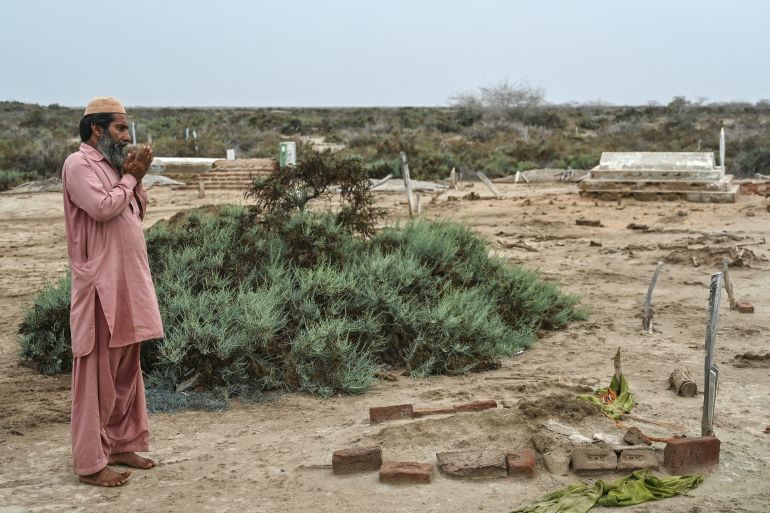Before leaving his parched island village in Pakistan’s Indus delta, salt crackles beneath the feet as Habibullah Khatti bids his final farewell to his mother’s grave.
The Indus River and the Arabian Sea delta, where farming and fishing communities are located in the south of the nation, have been destroyed by seawater intrusion.
About 15 kilometers (9 miles) from the point where the river empties into the sea, Khatti from Abdullah Mirbahar village in Kharo Chan, said, “The saline water has surrounded us on all four sides.”
The 54-year-old turned to tailoring as fish stocks fell, but only four of the remaining 150 households could afford it.
He claimed that as stray dogs scurried through the abandoned wooden and bamboo homes, “an eerie silence takes over the area” at night.
About 40 villages in Kharo Chan were once buried under rising seawater, but the majority have vanished. The town’s population fell from 26, 000 in 1981 to 11, 000 in 2023, according to census data.
Khatti is preparing to relocate his family to the nearby Karachi, Pakistan’s largest city, which is flooded with business migrants, including those from the Indus delta.
Tens of thousands of people have been displaced from the delta’s coastal districts, according to the Pakistan Fisherfolk Forum, which supports fishing communities.
According to a study released in March by the Jinnah Institute, a think tank led by a former climate change minister, more than 1.2 million people have been displaced from the entire Indus delta region.
According to a 2018 study from the US-Pakistan Center for Advanced Studies in Water, irrigation canals, hydropower dams, and the effects of climate change on glacial and snow melt have all decreased by 80% since the 1950s.
That has resulted in severe seawater intrusion. Since 1990, the water’s salinity has increased by about 70%, severely affecting the shrimp and crab populations and preventing the growth of crops.
According to local WWF conservationist Muhammad Ali Anjum, “the delta is both sinking and shrinking.”
The Indus River travels through disputed Kashmir before passing through Pakistan’s entire borderline. Millions of dollars’ worth of farming depend on the river and its tributaries, which irrigate about 80% of the country’s farmland. Once ideal for farming, fishing, mangroves, and wildlife, the delta, which is now made up of the river’s rich sediment that the river deposits as it meets the sea.
A government water agency study found that in 2019 over 16 percent of fertile land has lost its use as a result of encroachment of seawater.
A white layer of salt crystals blankets the ground in Keti Bandar, which extends inland from the water’s edge. Drinkable water is transported by goats from nearby villages using donkeys and carts.

Who “ever leaves their homeland voluntarily”? Haji Karam Jat, whose home was sucked up by the rising water level, claimed.
He anticipated more families would move his reconstruction farther inland. When someone has no other choice, they only leave their home country.
The first to change the Indus River’s course with canals and dams, which were followed by dozens of hydropower projects under British colonial rule. Farmers in Sindh province’s low-lying riverine regions protested, stopping several military-led canal projects on the Indus River earlier this year.
The government and the UN launched the “Living Indus Initiative” in 2021 to stop the Indus River Basin’s degradation. By addressing soil salinity and guarding local agriculture and ecosystems, one intervention aims to restore the delta.
The Sindh government is currently spearheading a project to restore mangrove forests, which act as a natural defense against saltwater intrusion. Land grabs and residential development projects cause clearing in other areas of the coastline even as mangroves are restored in some places.
After revoking a 1960 water treaty with Pakistan, which divides control over the Indus basin rivers, neighboring India is now a looming threat to the river and its delta. It has threatened never to reinstate the agreement, and instead has built dams downstream to stifle Pakistan’s flow of water, which it has described as “an act of war.”
According to climate activist Fatima Majeed, who works for the Pakistan Fisherfolk Forum, the communities have lost a way of life tightly rooted in the delta.
When women migrate to cities, Majeed, whose grandfather moved the family from Kharo Chan to the outskirts of Karachi, said they are particularly struggling to find employment when they have for generations packed the day’s catches and stitched nets.
Source: Aljazeera

Leave a Reply